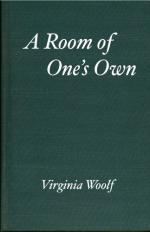
|
| Name: _________________________ | Period: ___________________ |
This test consists of 15 multiple choice questions and 5 short answer questions.
Multiple Choice Questions
1. After failing to find answers in other areas, what does the narrator look into upon her return to the British Museum?
(a) History.
(b) Art.
(c) Television.
(d) Poetry.
2. What year is this story set in?
(a) 1965.
(b) 1860.
(c) 1900.
(d) 1920.
3. Whose influence is all over the paper, and is "the power and the money and the influence," metaphorically?
(a) The narrator's own.
(b) The angry professor.
(c) God's.
(d) Woman's.
4. What occupation does Shakespeare's fictional sister set out to do?
(a) Writer.
(b) Actress.
(c) Waitress.
(d) Seamstress.
5. What writer does the narrator list as one whose self-consciousness the reader is aware of?
(a) Keats.
(b) Flaubert.
(c) All of the above.
(d) Rousseau.
6. What does the narrator find fascinating about all the books written about women?
(a) That there are so few available.
(b) That they are all so good.
(c) That they are all 100 years old.
(d) That there are so many written by men.
7. Which museum does the narrator visit in Chapter 2?
(a) The Met.
(b) The Smithsonian.
(c) British Museum.
(d) Modern Museum.
8. In the fictional tale of Shakespeare's sister, how old is she when she leaves home?
(a) Fifteen.
(b) Eighteen.
(c) Not yet seventeen.
(d) Almost twenty.
9. What topic has the narrator asked to lecture about?
(a) Women and fiction.
(b) Women and poetry.
(c) Women and books.
(d) Women and men.
10. What characteristic does the narrator find is often assigned to fictional women?
(a) Wealth.
(b) Poverty.
(c) Anger.
(d) Heroism.
11. The narrator finds that the woman "pervades _________ from cover to cover;"
(a) Poetry.
(b) History.
(c) The news.
(d) Romance.
12. What building is the narrator not allowed into at the men's college?
(a) The dining hall.
(b) The church.
(c) The dormitory.
(d) The library.
13. How does Shakespeare's fictional sister die?
(a) She falls of a horse.
(b) She is murdered.
(c) She dies in childbirth.
(d) She kills herself.
14. The narrator says that prunes are not _________.
(a) Food.
(b) Vegetables.
(c) Tasty.
(d) Fruit.
15. How many children did "Mrs. Seton" have?
(a) 3.
(b) 13.
(c) 1.
(d) 5.
Short Answer Questions
1. What emotion sneaks up on the narrator while she is reading the Professor's work?
2. To what does the narrator compare compiling information about the day-to-day life of a woman?
3. What object does the narrator think best exemplifies a woman's purpose for a man?
4. Where does the narrator go after leaving the museum?
5. What does the narrator compare to a fish as she sits thinking by the river bank?
|
This section contains 392 words (approx. 2 pages at 300 words per page) |

|




